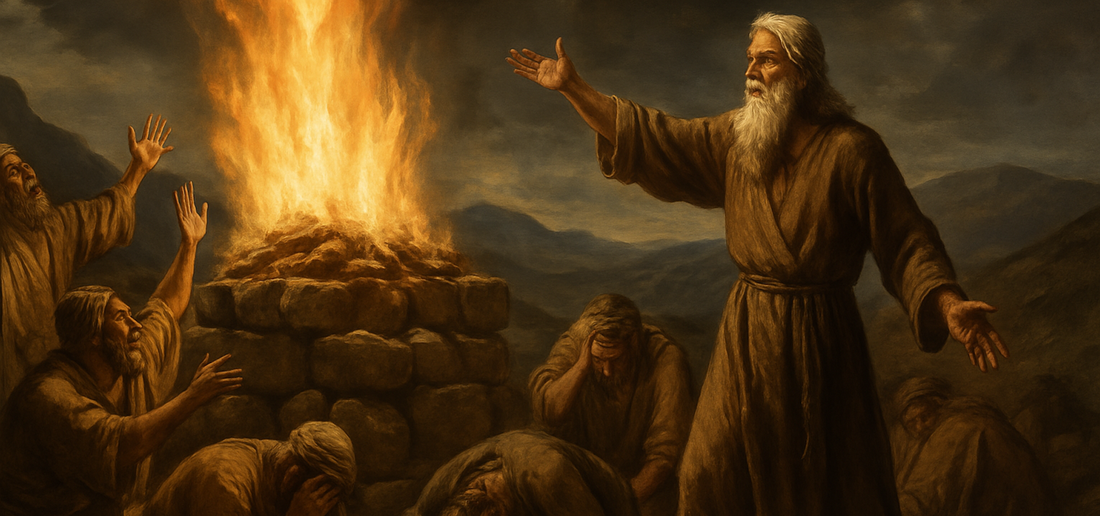As I delve deeper into this study, I aim to uncover the characteristics and tactics of the spirits of Jezebel and Ahab, drawing from their biblical roots in the Old Testament. By examining the story of King Ahab and Jezebel in 1 Kings 16–22, I’ve observed patterns that reveal how these spirits operate and their devastating impact on God’s people. Let’s explore their nature and the lessons we can learn.
The Introduction of Jezebel
The first mention of Jezebel in Scripture sets the stage for her influence:
And it came to pass, as though it had been a trivial thing for him to walk in the sins of Jeroboam the son of Nebat, that he took as wife Jezebel the daughter of Ethbaal, king of the Sidonians; and he went and served Baal and worshiped him.
—1 Kings 16:31
Jezebel, daughter of Ethbaal, king of the Sidonians (ruling over Tyre), was a priestess of Baal and a worshiper of idols. I’ve noted that her marriage to Ahab wasn’t inherently wrong, but her refusal to abandon idol worship and serve the one true God was. This union marked the beginning of her destructive influence. Through seduction, Jezebel led Ahab into spiritual blindness and idolatry, causing him to worship Baal. As queen, she gained significant authority but disrespected Ahab’s God-given role, manipulating him to serve her will and promote idol worship.
God’s Judgment and Provision
Ahab’s disobedience brought divine consequences, as God sent Elijah to confront him:
And Elijah the Tishbite, of the inhabitants of Gilead, said to Ahab, “As the LORD God of Israel lives, before whom I stand, there shall not be dew nor rain these years, except at my word.”
—1 Kings 17:1
Despite Ahab’s spiritual blindness, I’ve seen that he knew his marriage to Jezebel violated God’s commands. His idolatry triggered a drought, a direct judgment from God. Yet, God’s mercy shone through for the righteous:
For thus says the LORD God of Israel: ‘The bin of flour shall not be used up, nor shall the jar of oil run dry, until the day the LORD sends rain on the earth.’
—1 Kings 17:14
I’ve witnessed how God sustains those who remain faithful, ensuring His anointing flows through them, regardless of compromised leaders like Ahab.
The Power of God’s Miracles
One profound miracle stands out in this narrative:
Then the LORD heard the voice of Elijah; and the soul of the child came back to him, and he revived. And Elijah took the child and brought him down from the upper room into the house, and gave him to his mother. And Elijah said, “See, your son lives!” Then the woman said to Elijah, “Now by this I know that you are a man of God, and that the word of the LORD in your mouth is the truth.”
—1 Kings 17:22-24
I’ve learned that while Satan can mimic some miracles, only God can raise the dead. This act confirmed Elijah’s authority and God’s truth, contrasting with Jezebel’s self-promotion and idolatry. God’s power speaks for itself, requiring no explanation.
Confronting Ahab’s Pride
Years into the drought, God sent Elijah back to Ahab, who responded with arrogance:
Then it happened, when Ahab saw Elijah, that Ahab said to him, “Is that you, O troubler of Israel?” And he answered, “I have not troubled Israel, but you and your father’s house have, in that you have forsaken the commandments of the LORD and have followed the Baals. Now therefore, send and gather all Israel to me on Mount Carmel, the four hundred and fifty prophets of Baal, and the four hundred prophets of Asherah, who eat at Jezebel’s table.”
—1 Kings 18:17-19
I’ve observed Ahab’s prideful attitude, blaming Elijah for Israel’s troubles—a hallmark of the spirit of Ahab, which shirks responsibility. God responded decisively on Mount Carmel:
And it came to pass, at the time of the offering of the evening sacrifice, that Elijah the prophet came near and said, “LORD God of Abraham, Isaac, and Israel, let it be known this day that You are God in Israel and I am Your servant, and that I have done all these things at Your word. Hear me, O LORD, hear me, that this people may know that You are the LORD God, and that You have turned their hearts back to You again.” Then the fire of the LORD fell and consumed the burnt sacrifice, and the wood and the stones and the dust, and it licked up the water that was in the trench. Now when all the people saw it, they fell on their faces; and they said, “The LORD, He is God! The LORD, He is God!”
—1 Kings 18:36-39
Elijah’s confidence came from his God-given authority. God’s fire wasn’t about proving His power but about turning His people’s hearts back to Him. I’ve seen that true worship, as the people demonstrated, leads to restoration:
Then it came to pass the seventh time, that he said, “There is a cloud, as small as a man’s hand, rising out of the sea!” So he said, “Go up, say to Ahab, ‘Prepare your chariot, and go down before the rain stops you.’” Now it happened in the meantime that the sky became black with clouds and wind, and there was a heavy rain.
—1 Kings 18:44-45
This small cloud, insignificant to natural eyes, signaled God’s restoration after repentance. I’ve learned that genuine surrender to God’s purifying fire brings renewal, but resistance requires repeated repentance.
Jezebel’s Retaliation
When Ahab recounted Elijah’s victory, Jezebel’s true nature surfaced:
And Ahab told Jezebel all that Elijah had done, also how he had executed all the prophets with the sword. Then Jezebel sent a messenger to Elijah, saying, “So let the gods do to me, and more also, if I do not make your life as the life of one of them by tomorrow about this time.” And when he saw that, he arose and ran for his life, and went to Beersheba, which belongs to Judah, and left his servant there.
—1 Kings 19:1-3
I’ve noted Jezebel’s hysterical response when exposed. She deflected blame, using intimidation and manipulation—hallmarks of her spirit—to silence God’s messengers. Elijah, despite his faith, fled in fear, showing the power of her tactics.
Hearing God’s Voice
God met Elijah in his fear, teaching a vital lesson:
Then He said, “Go out, and stand on the mountain before the LORD.” And behold, the LORD passed by, and a great and strong wind tore into the mountains and broke the rocks in pieces before the LORD, but the LORD was not in the wind; and after the wind an earthquake, but the LORD was not in the earthquake; and after the earthquake a fire, but the LORD was not in the fire; and after the fire a still small voice.
—1 Kings 19:11-12
I’ve seen many churches, including leaders, chase spectacular signs while missing God’s still small voice. It’s only through surrender, after the purifying fire, that we hear Him clearly. This relational intimacy is what God desires most.
Jezebel’s Deception
Jezebel’s true character emerges in the story of Naboth’s vineyard:
And it came to pass after these things that Naboth the Jezreelite had a vineyard which was in Jezreel, next to the palace of Ahab king of Samaria. So Ahab spoke to Naboth, saying, “Give me your vineyard, that I may have it for a vegetable garden, because it is near, next to my house; and for it I will give you a vineyard better than it. Or, if it seems good to you, I will give you its worth in money.” But Naboth said to Ahab, “The LORD forbid that I should give the inheritance of my fathers to you!” So Ahab went into his house sullen and displeased because of the word which Naboth the Jezreelite had spoken to him; for he had said, “I will not give you the inheritance of my fathers.” And he lay down on his bed, and turned away his face, and would eat no food. But Jezebel his wife came to him, and said to him, “Why is your spirit so sullen that you eat no food?” He said to her, “Because I spoke to Naboth the Jezreelite, and said to him, ‘Give me your vineyard for money; or else, if it pleases you, I will give you another vineyard for it.’ And he answered, ‘I will not give you my vineyard.’” Then Jezebel his wife said to him, “You now exercise authority over Israel! Arise, eat food, and let your heart be cheerful; I will give you the vineyard of Naboth the Jezreelite.” And she wrote letters in Ahab’s name, sealed them with his seal, and sent the letters to the elders and the nobles who were dwelling in the city with Naboth. She wrote in the letters, saying, Proclaim a fast, and seat Naboth with high honor among the people; and seat two men, scoundrels, before him to bear witness against him, saying, “You have blasphemed God and the king.” Then take him out, and stone him, that he may die.
—1 Kings 21:1-10
I’ve observed Jezebel’s cunning manipulation here. When Naboth refused to surrender his God-given inheritance, Ahab sulked, embodying the victimhood of his spirit, while Jezebel resorted to deceit, false accusations, and murder. Using Ahab’s authority, she orchestrated Naboth’s public humiliation and death, framing him for blasphemy—a tactic of the religious spirit.
God’s Judgment
God’s response was clear:
And concerning Jezebel the LORD also spoke, saying, ‘The dogs shall eat Jezebel by the wall of Jezreel.’ The dogs shall eat whoever belongs to Ahab and dies in the city, and the birds of the air shall eat whoever dies in the field.”
—1 Kings 21:23-24
I believe God’s judgment on Jezebel is a warning for today, as Revelation 2 states:
Indeed I will cast her into a sickbed, and those who commit adultery with her into great tribulation, unless they repent of their deeds.
Ministries influenced by the spirits of Jezebel and Ahab—marked by manipulation, control, or idolatry—will face collapse unless they repent. I’ve seen this unfolding in our time, as God purifies His church.
A Call to Discernment
Finally, I reflect on God’s warning:
Thus says the LORD: “Cursed is the man who trusts in man and makes flesh his strength, whose heart departs from the LORD. For he shall be like a shrub in the desert, and shall not see when good comes, but shall inhabit the parched places in the wilderness, in a salt land which is not inhabited.”
—Jeremiah 17:5-6
I urge believers to trust God, not human strength, and to seek His voice. The spirits of Jezebel and Ahab thrive on deception, but through repentance and surrender, we can stand firm in God’s truth and authority.









